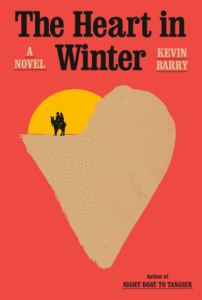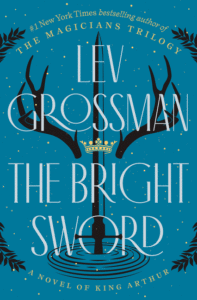
Kevin Barry’s The Heart in Winter, Anne Applebaum’s Autocracy, Inc., Lev Grossman’s The Bright Sword, and Taffy Brodesser-Akner’s Long Island Compromise all feature among July’s best reviewed books.

1. The Heart in Winter by Kevin Barry
(Doubleday)
13 Rave • 2 Positive • 1 Mixed • 1 Pan
Read an interview with Kevin Barry here
“A rare thing. The Irish writer Kevin Barry’s fourth novel is a strongly plotted book that offers a doomed love affair, horses, high mountains, bad weather, a desperate journey and even a knife fight; a Western, in short, and a good one. But that plot is the least compelling thing about it, and the novel’s real force lies in the mordant wit of its language … Barry’s sentences are often long and flowing and yet sharply angled too. They lilt but don’t lull, and are virtually impossible to quote at length … What sets him apart is the bright black hole, the grim laughter, of his language, with his sentences all ‘bass tones and bottom.’ This short, tight novel pulls one so swiftly along that it can be read on a summer’s afternoon.”
–Michael Gorra (The Wall Street Journal)
2. Long Island Compromise by Taffy Brodesser-Akner
(Random House)
11 Rave • 2 Positive • 3 Mixed • 1 Pan
Read an interview with Taffy Brodesser-Akner here
“Brodesser-Akner is ridiculously clever, but never overly so and never merely for the sake of showing off her prodigious way with words. A big reason I love her writing—in any medium—is that every sentence serves the whole. Every word is carefully chosen and I trust that the journey she takes us on will end at a destination worth visiting … This isn’t a breezy beach read and, like Fleishman, you want to restart it as soon as you’re done, to find what you missed.”
–Rochelle Olson (The Star Tribune)

3. The Bright Sword by Lev Grossman
(Viking)
8 Rave • 1 Positive • 1 Mixed
Read an excerpt from The Bright Sword here
“Resoundingly earns its place among the best of Arthurian tales … The book is long, more than 600 pages, and it feels long. The story meanders, but other than a few back story chapters that are, if not unnecessary, perhaps mistimed, nothing feels superfluous. This is a narrative that demands and rewards patience … Grossman…is at the top of his game with The Bright Sword, which is full of enviable ideas and execution. Few authors could accomplish what he has, grounding such an ambitious novel in so much tradition and history while still making it accessible and deeply affecting.”
–Kiersten White (The New York Times Book Review)
4. Someone Like Us by Dinaw Mengestu
(Knopf)
6 Rave • 3 Positive
“The kind of anti-characterization that Mengestu plays with here is risky. Rather than merely feeling disassociated, Mamush courts featurelessness…Rather than become a tragic, mysterious father figure, Samuel could end up just a bundle of confusions that resist interpretation—Schrodinger’s dad. But Mengestu’s solution is a sharp one: He makes the urge to craft a coherent story something of a character in itself, revealing how desperate we are to contrive narratives from scattered parts. In the closing chapters, Mengestu concocts a kind of fantasia out of this instinct, building an imagined story about Samuel from the available evidence, shaped by Mamush’s own uncertain yearnings … in Mengestu’s hands, plotlessness and incomprehension never seemed so essential to getting the story right.”
–Mark Athitakis (The Los Angles Times)
5. Banal Nightmare by Halle Butler
(Random House)
5 Rave • 4 Positive
“There are some novels so searingly precise in their ability to capture a certain moment or experience that you have to stop every few pages to send another perfect quote to your group chat. Halle Butler’s latest, Banal Nightmare, is one such book … Will have many millennials intently nodding along to Butler’s clever insights. While not necessarily the first in the category of the millennial midlife novel, Banal Nightmare may be one of the most essential.”
–Amil Niazi (The New York Times Book Review)
**
1. The Bluestockings: A History of the First Women’s Movement by Susannah Gibson
(W. W. Norton & Company)
4 Rave • 5 Positive • 1 Mixed
“Deftly interwoven … Gibson’s own balancing act, skilfully managed, is to highlight the extraordinary place these women carved out for themselves against the odds in 18th-century society, without glossing over aspects less congenial to 21st-century readers. It is often tempting to uncritically champion pioneering women in history with a sort of proto-girlboss feminism. Bluestockings is much more sophisticated stuff than this, and all the richer for it.”
–Hannah Rose Woods (The New Statesman)
2. The Talented Mrs. Mandelbaum: The Rise and Fall of an American Organized-Crime Boss by Margalit Fox
(Random House)
3 Rave • 6 Positive
“Ms. Fox has produced a vivid portrait of Mandelbaum in this rich recounting of her life and times. Best-known as an obituary writer for the New York Times, Ms. Fox knows how to synthesize facts and shape a story … Sometimes, the extraneous information threatens to swamp the Mandelbaum story, especially as there are also copious footnotes on nearly every page. But Ms. Fox is too skilled a writer to slow the momentum for long.”
–Charlotte Gray (The Wall Street Journal)
3. Autocracy, Inc.: The Dictators Who Want to Run the World by Anne Applebaum
(Doubleday)
2 Rave • 6 Positive • 2 Mixed
“Applebaum rightly places kleptocratic institutionalized thievery at the center of her analysis … A valuable book for many reasons, but the focus on illicit wealth creation and on those in democracies who enable it is especially timely. So is Applebaum’s recommendation that we wage war on autocratic behaviors wherever they occur.”
–Ruth Ben-Ghiat (The Washington Post)
4. Alexander at the End of the World: The Forgotten Final Years of Alexander the Great by Rachel Kousser
(Mariner)
2 Rave • 5 Positive • 1 Mixed
“A breath of fresh air … Kousser’s biography extends beyond Alexander’s military movements and into his emotional life … Her account is exhaustively researched—many chapters extend past 100 footnotes—but remains approachable.”
–Valorie Castellanos Clark (The Los Angeles Times)
5. The Rent Collectors: he Rent Collectors: Exploitation, Murder, and Redemption in Immigrant LA by Jesse Katz
(Astra House)
5 Rave
“Katz has constructed an ethnography of the crime, locating it within the intricate lacework of history, geography, policing and politics that the crime was knotted to … Katz…brings his formidable skills to mapping the territory of Macedo’s crime … Katz has constructed a riveting and masterful urban narrative … Sets out to understand an evil act and asks whether atonement and redemption are possible for the person who did it. It finds a web of meaning in which all of us are suspended, implying that many other crimes could be understood in such a holistic way if we took the time. As much as is possible after such a senseless tragedy, Katz makes some sense out of that September day.”
–Lorraine Berry (The Los Angeles Times)

